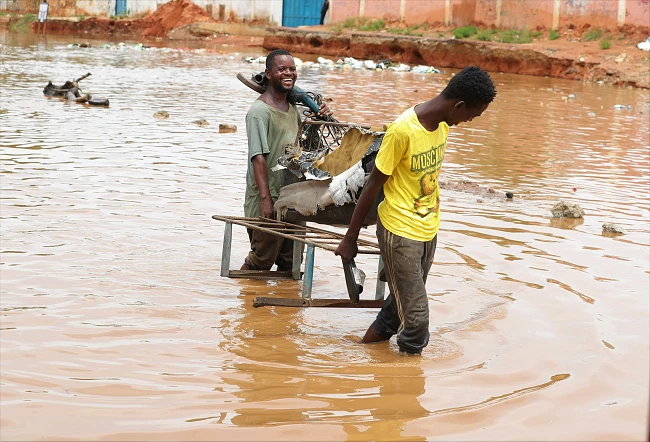Among deaths, destruction, and tides of garbage, the recent torrential rains that have lashed Luanda also stimulate the creativity and entrepreneurship of the residents of the Angolan capital in search of daily sustenance.
Renting boots or plastic bags, foot-washing services, or taking a “toll” on improvised bridges to cross flooded areas are some activities in the city where the rain has not given a truce.
In most neighborhoods, the population tries to drain the water from flooded houses and streets using buckets and pumps and to recover some of their possessions from the mud and garbage dragged by the force of the waters while exploring business opportunities.

Eduardo Diogo, a 23-year-old mechanic and resident of the municipality of Cazenga, one of the most populous in the Angolan capital, is the “founder” of the bridge that crosses the drainage ditch of the “7th Avenue”, charging pedestrians and motorcyclists.
The ditch, where several people have already died and a tide of garbage has accumulated, which now hides the water, is also a breeding ground for mosquitoes and houses precarious bridges of wooden planks, garbage, and mud, where passers-by risk unsteady crossings.
With prices that vary between Kw50 and Kw100 (€0.09 and €0.18), the young man guarantees that he uses the money to buy material to build new bridges, keeping a part for himself, and regrets that despite the complaints made to government authorities there are still no solutions to the dangerous ditch.
Sérgio Salvador Diogo, 26 years old, is a motorcyclist and also protests against the situation.
“We are getting frustrated; we are seeing the children, the garbage, then when it rains, the water goes even in the neighborhoods, in the kubicos (houses)”, he told Lusa, complaining about the mosquitoes and the garbage from the open ditch.
“I really want them to cover up this mambo,” he appeals.
He says whoever made the bridge has reasons to charge and claims to the neighborhood’s youth the role of promoter of the precarious infrastructure thought for those who want to date.
“Our mboas [women] are here. So that we don’t miss each other we put up a bridge, and now strangers who don’t date and are not from here pay even 50”
“We have reason to charge because this bridge is private, not state-owned; nobody is stealing here.
Sebastião Francisco, a 69-year-old tailor, also regrets the flooding of the streets in sector 5 of Cazenga Popular but is thankful for the help of the municipal administration that lent electric pumps to complement the manual force of the brooms.
At the entrance of the Kikolo market, one of the best known in Luanda, the misfortune of some also offers opportunities for others who rent boots or trade plastic bags for those who want to go to the market where the access is totally flooded and muddy.
In the same place, some provide services by washing the feet of passersby, although with little enthusiasm.
“João Lourenço, we are suffering; where are the 500,000 jobs? Is washing feet employment?” question some of the foot-washing ladies.
Since last week the rains have already caused the death of at least seven people, including three children, in the early hours of Tuesday, in addition to collapsed trees, thousands of flooded homes, and falling electricity poles.
For the next 24 hours, the National Institute of Meteorology and Geophysics (INAMET) forecasts moderate rain for the province of Luanda, which may be locally heavy, with the probability of thunderstorms in some municipalities.
With information from Lusa

